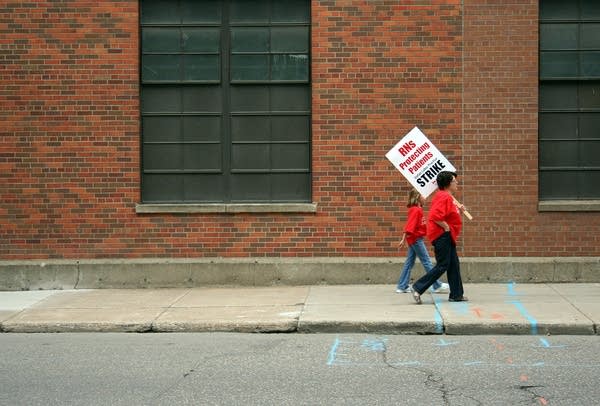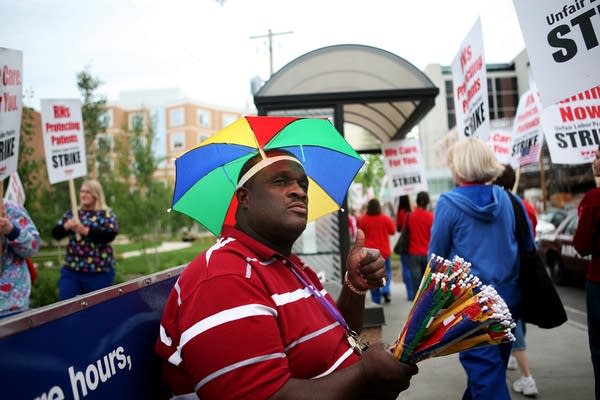Issues remain after nurses strike

Twin Cities nurses are expected to return to work Friday after participating in the largest nurses strike in the country's history.
About 12,000 nurses at 14 metro hospitals walked off the job for 24 hours on Thursday. They're fighting to keep their pension benefits and increase staffing, but what happens next is still unclear.
After weeks of build up, the strike could be seen as kind of anticlimactic.
"It was normal. It was just like yesterday or the day before," said Richard Foster, who went into North Memorial hospital on Monday for surgery on his right knee.
Create a More Connected Minnesota
MPR News is your trusted resource for the news you need. With your support, MPR News brings accessible, courageous journalism and authentic conversation to everyone - free of paywalls and barriers. Your gift makes a difference.
He knew a strike was imminent, and Foster asked his regular nurses about the dispute in the days leading up to the strike.
"There was no trash talking or anything like that and then today it was a replacement nurse that checked me out," he said. "She did a good job."
The hospitals hired 2,800 substitute nurses from across the country to replace the strikers. They say they don't yet know exactly how much that cost them.

Foster's replacement nurse was from New Orleans. Foster and his wife told her she had to see the rest of the state, and Foster said the nurse told them she had spent the previous day at Mall of America.
Other patients have reported delays and longer waits, and Foster hasn't formed an opinion about the dispute. But, the way he sees it, everything went the way it should have.
"They have their reasons for doing it and, you know, it's the American way," he said.
The nurses want to establish set ratios of nurses to patients in order to -- in their opinion -- ensure quality care. The hospitals say that approach would tie their hands and end up raising costs.

At the end of the day Thursday, Dr. Phil Kibort, chief medical officer for Children's Hospital in Minneapolis, said the way the hospitals handled the strike demonstrated why providers need flexibility.
He said each hospital took its own approach, tweaking contingency plans to suit its own needs.
"There is no cookie cutter solution to health care," Kibort said. "While a strike is never a welcome situation we have no interest in repeating this experience. It does demonstrate though the need to allow of allowing providers to make appropriate adjustments to meet patient needs."
Many hospitals rescheduled elective surgeries, so there were far fewer patients in the hospitals than normal. Kibort said the staffing ratios of nurses to patients were the same as a regular day.
But Minnesota Nurses Association negotiator Nellie Munn said hospital staff who remained on the job yesterday reported many problems to the strikers. She said the hospitals aren't acknowledging those problems because it isn't in their interest.

"We've seen this before ... their vision of reality is not consistent with what's actually happening," Munn said. "It really doesn't surprise me. I wouldn't have expected them to say anything different."
The question for both sides now is what happens next. The hospitals say they're ready to negotiate, but they're taking their cues from federal mediators who have yet to set up a meeting.
Union leaders say they haven't yet considered proposing another strike day.
Gary Chaison, a professor of labor relations at Clark University in Worcester, Massachusetts, said their actions may have consequences in several other states.
"What we're seeing now is a greater militancy on the part of nurses," Chaison said. "I think throughout the country we'll see further militancy, maybe strikes, maybe lobbying, and maybe demonstrations by nurses. A group who feels they're frustrated, left out of decision making, and they want to be at the table."
Chaison said health care reform forced hospitals to cut costs and nurses are feeling the pinch. He said nurses across the nation are banding together because they feel like people will only pay attention to one big collective voice.
Chaison said what's at stake is control, and hospitals and nurses may have to agree on how to share it in order for the strikes to end.
(MPR reporter Laura Yuen contributed to this report.)
